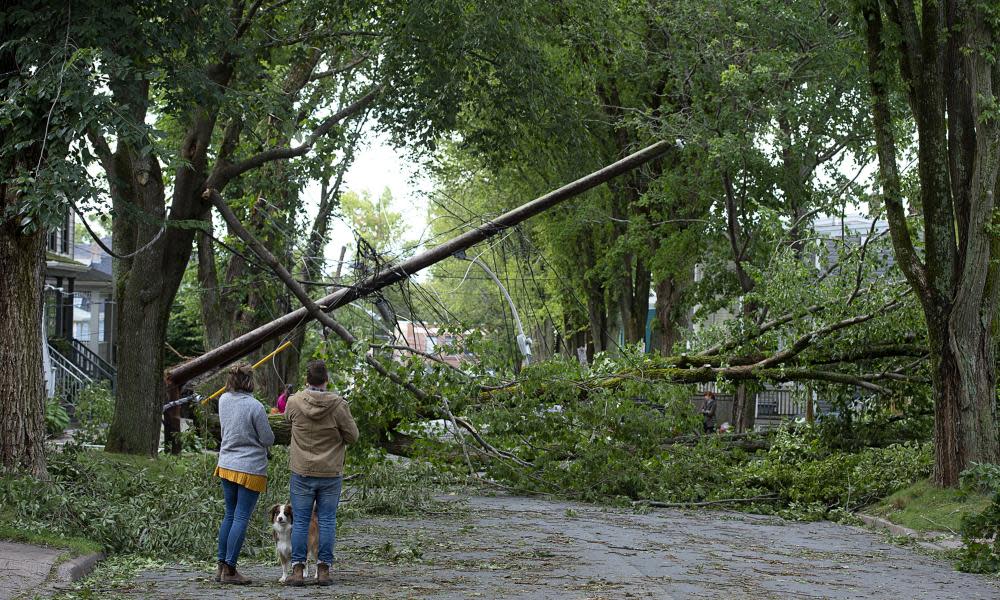Canada: Hurricane Dorian's sting in the tail leaves 500,000 without power

After a weekend of bruising winds and torrential rain unleashed by Hurricane Dorian, emergency crews on Canada’s east cost have begun the task of restoring electricity to the region after more than 500,000 residents were left without power.
Related: Search for survivors of Hurricane Dorian continues in Bahamas
Dorian was downgraded to a post-tropical storm as it made landfall near Halifax, Nova Scotia, on Saturday evening, but wind speeds still reached 150km/h (93mph), similar in intensity to a category 2 hurricane.
Trees, power lines and even a crane in downtown Halifax were knocked down by the powerful gusts, leaving half a million people without power and in many cases, without cellphone service. More than 100mm (4in) of rain also fell in less than 24 hours.
While the intensity of the storm was nothing like the category 5 hurricane that devastated the Bahamas last week, the widespread damage nonetheless left emergency crews scrambling throughout the collection of Maritime provinces.
“This is an exercise of days, not hours,” Karen Hutt, CEO of Nova Scotia Power, told reporters on Sunday. “We’re operating in our worst-case scenario.”
Power technicians from Ontario, Quebec, Maine – and as far away as Florida – were dispatched to assist local crews restore power. The Canadian military also deployed forces to help clear roads.
By Monday, as power was restored in some areas, residents were left to assess damage. Many of the streets in Halifax, the largest city on the east coast, had large trees uprooted, tearing up sidewalks and roads and pulling down power lines. At least 200,000 remained without electricity in Nova Scotia, New Brunswick, Prince Edward Island and Newfoundland and Labrador.
Long lines outside fast-food restaurants – including the coffee chain Tim Hortons – blocked emergency vehicle routes, prompting city officials to request residents stay at home.
Post-hurricane Tim Hortons lineup in Halifax, Nova Scotia pic.twitter.com/7FveuuHqjk
— Brett Ruskin (@Brett_CBC) September 8, 2019
“People need to stay off the roads today. Let us get out there and do our jobs,” Erica Fleck, an assistant chief with Halifax Regional Fire and Emergency, told reporters on Sunday.
“We can’t clear [the roads] until we can actually get to the roads, and 300 cars at a drive-thru right now is really stopping our progress.”
The Nova Scotia premier, Stephen McNeil, also chastised residents for blocking traffic. “There’ll be plenty of time for you to come down and get your coffee. You don’t have to do that today. It’s important to allow the level of professionals we have in this province go out and do their work,” he said at a weekend press conference.
Public schools were closed throughout the region on Monday as crews worked to saw through trees and repair downed electrical lines, hopeful that power would be fully restored later this week.

